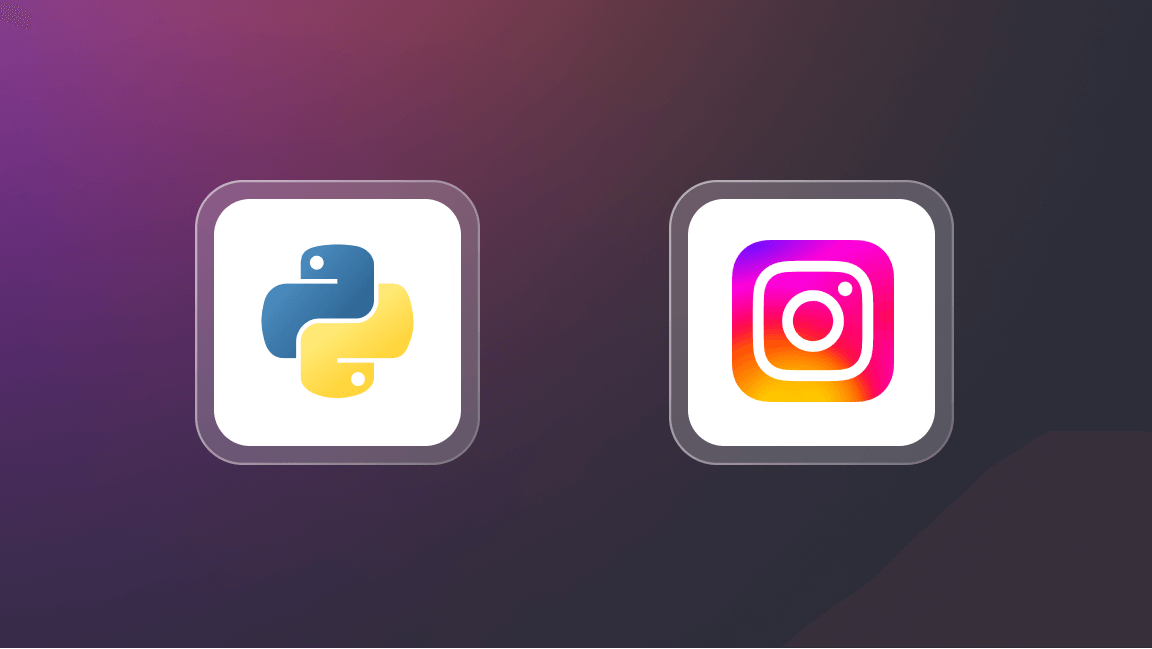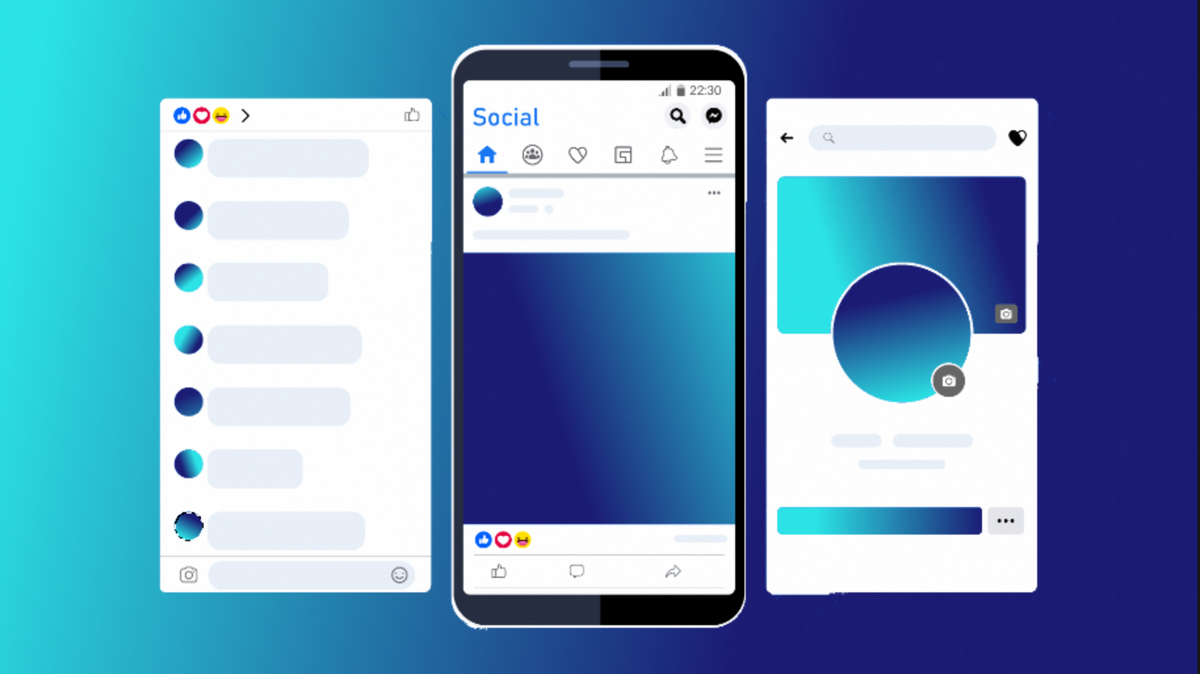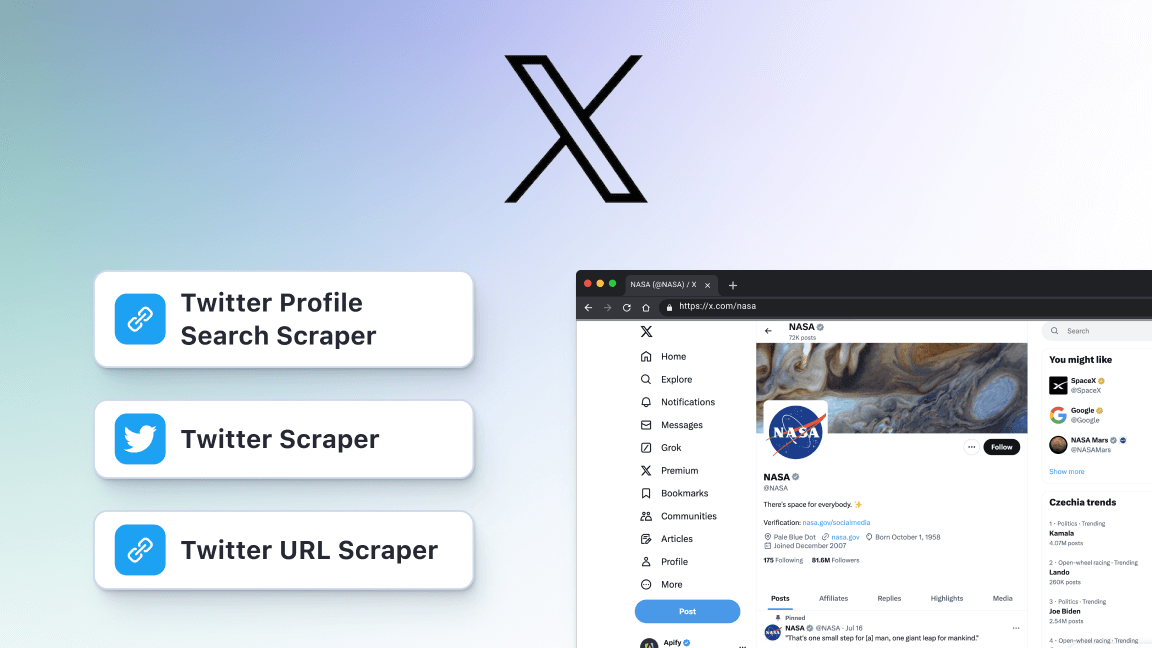Social media has become an integral part of modern marketing and research strategies. And while establishing a presence on social media platforms is a challenge of its own, there's a whole new dimension of insights waiting to be uncovered by web scraping and downloading the data these apps provide.
But can anyone just scrape a website these days? In 2025, the answer is yes. Follow along to discover 8 social media scraping tools that can do the heavy lifting for you.
1) Instagram Scraper
Instagram is a treasure trove of user-generated content and engagement. Instagram Scraper allows you to gather information about posts, profiles, places, hashtags, photos, and comments. Integrating this data into content platforms enables advanced audience segmentation, competitor analysis, or campaign optimization.
Using Instagram Scraper is very easy to use. All you have to do is to fill in the input schema. It looks like this:
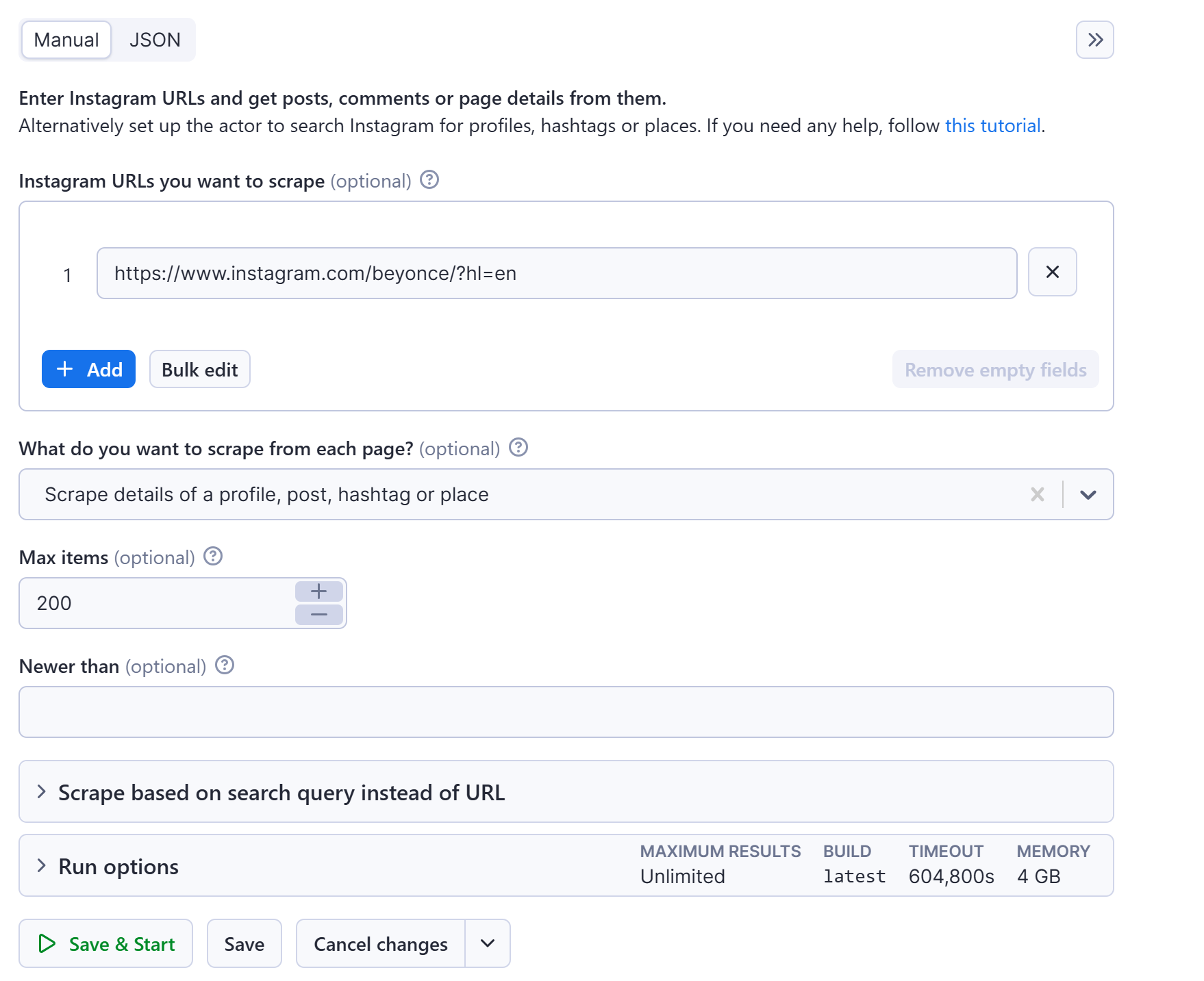
Once you hit the start button, you’ll get a table with results in a few minutes. You can download in Excel, or JSON, and proceed with your analysis.
📷 Follow along with our guide on how to scrape Instagram →
Is web scraping Instagram legal?
This Instagram Scraper does not scrape any private data, only those that are publicly available on the web. In other words, running this scraper is totally legal, as long as you use it ethically.
Why do people scrape Instagram?
There’s is a long list of reasons why people are interested in scraping Instagram. From marketing agencies looking for a way how to backup their strategies with data, to influencers who want to assess their performance and monitor competitors.
2) TikTok Data Extractor
TikTok's rapid rise in popularity makes it an essential platform for every TikTok advertising agency or social media expert to look into the needs and wants of a younger audience. TikTok Data Extractor enables you to collect data on trending hashtags, videos, user profiles, and engagement metrics such as number of comments, shares, followers and total likes.
You can get your data with just a hashtag, search query, or URL. The results will be displayed in a simple table. Just like this:
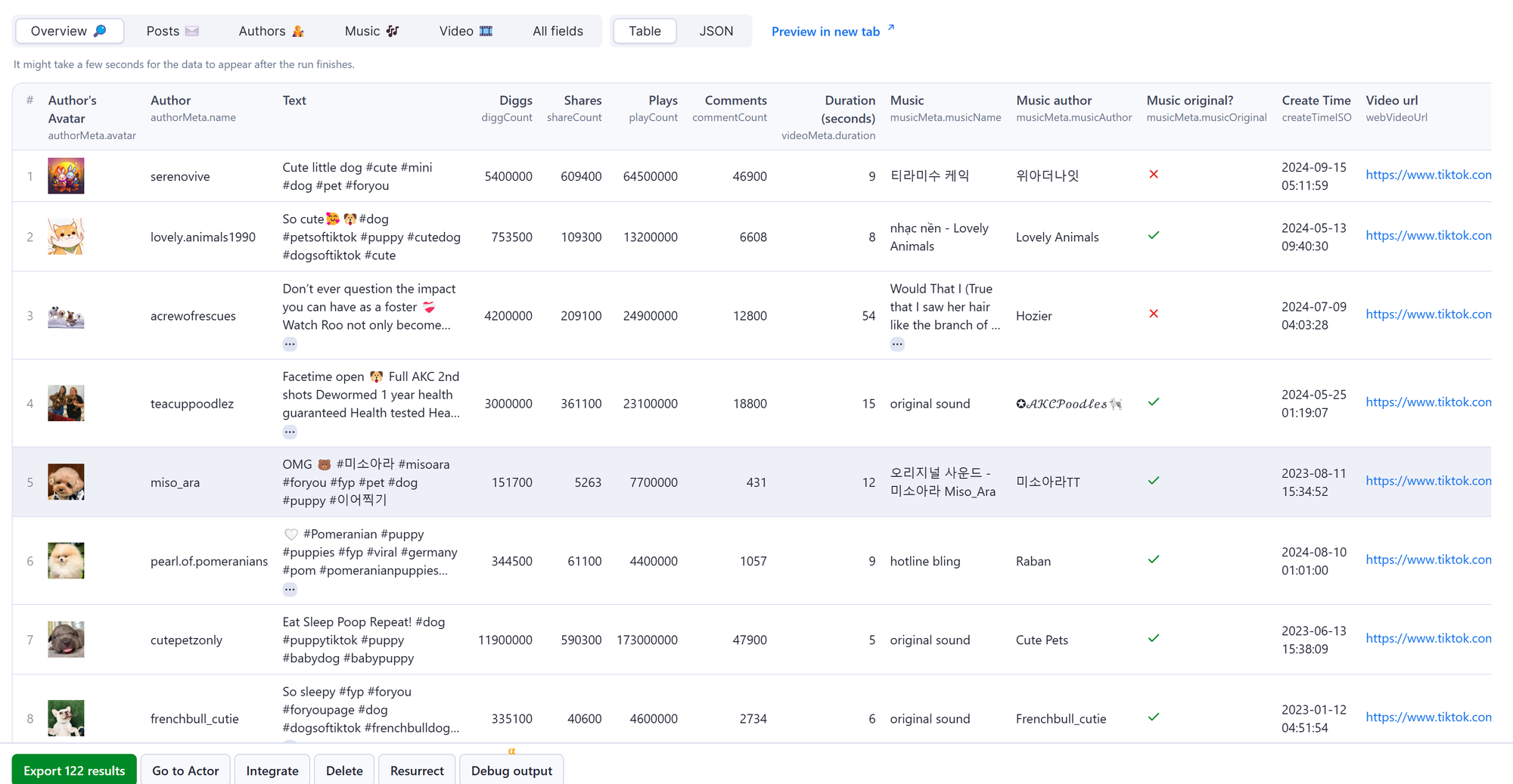
🎵 Follow along with our simple guide on how to scrape TikTok →
Does TikTok allow web scraping?
Scraping any data that you can find on the web yourself is legal. However, TikTok provides its APIs only for selected researchers, so you might want to look for other tools, such as the above-mentioned TikTok Data Extractor or other scrapers from the TikTok family.
3) Facebook Comments Scraper
Facebook remains an essential platform for connecting with a diverse audience. Facebook Comments Scraper 🔗 allows you to extract data from public pages, posts, and comments.
This tool can assist you with crisis management and content moderation. Monitoring comments during a crisis or PR incident can help you measure public sentiment and identify potential issues that need addressing. A prompt response to negative comments can help you manage and mitigate reputational damage in a time of crisis. Scraping comments can also help identify and flag inappropriate or spammy content for removal to ensure compliance with community guidelines.
📘Follow along with our simple guide on how to scrape Facebook →
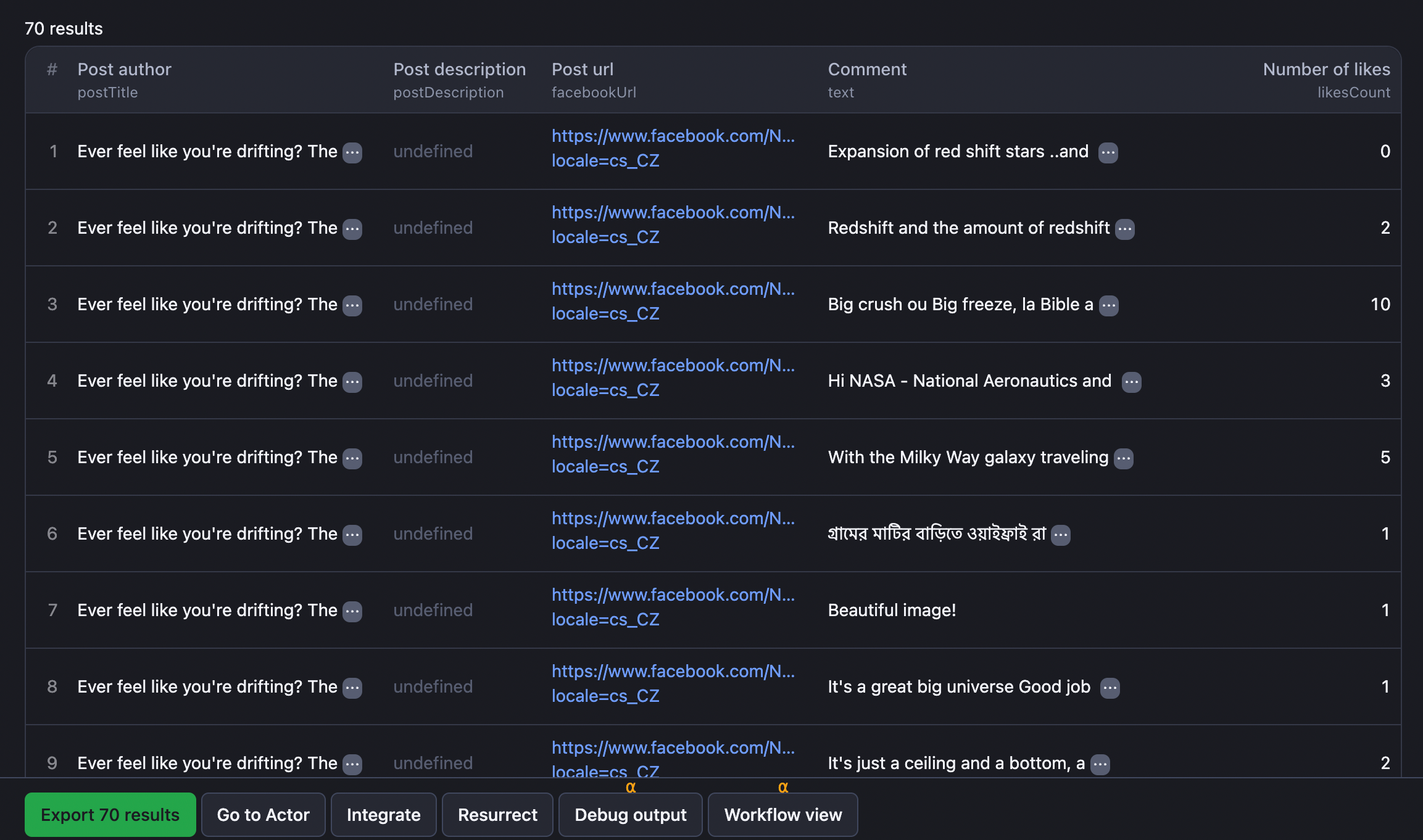
What is the best Facebook scraping tool?
The best Facebook scraping tool depends entirely on your project and the data you need to get. Apart from Facebook Comments Scraper, there are multiple tools designed specifically for niche use cases such as extracting data about Facebook events or marketplaces.
Take a look at this list to explore them all:
Is Facebook scraper legal?
As long as you crawl Facebook data that is not hidden under a login, scraping social media is perfectly legal. You can read more about the legality of web scraping in this article and find out about recent web scraping legal law suits.
4) YouTube Scraper
YouTube remains a thriving entertainment platform and a large search engine. YouTube Scraper enables you to gather data on video views, likes, subscribers, and channel performance.
By extracting data from YouTube, you can find new trends and make decisions about collaboration opportunities.
See what data you get with YouTube Scraper just by entering the query puppies.
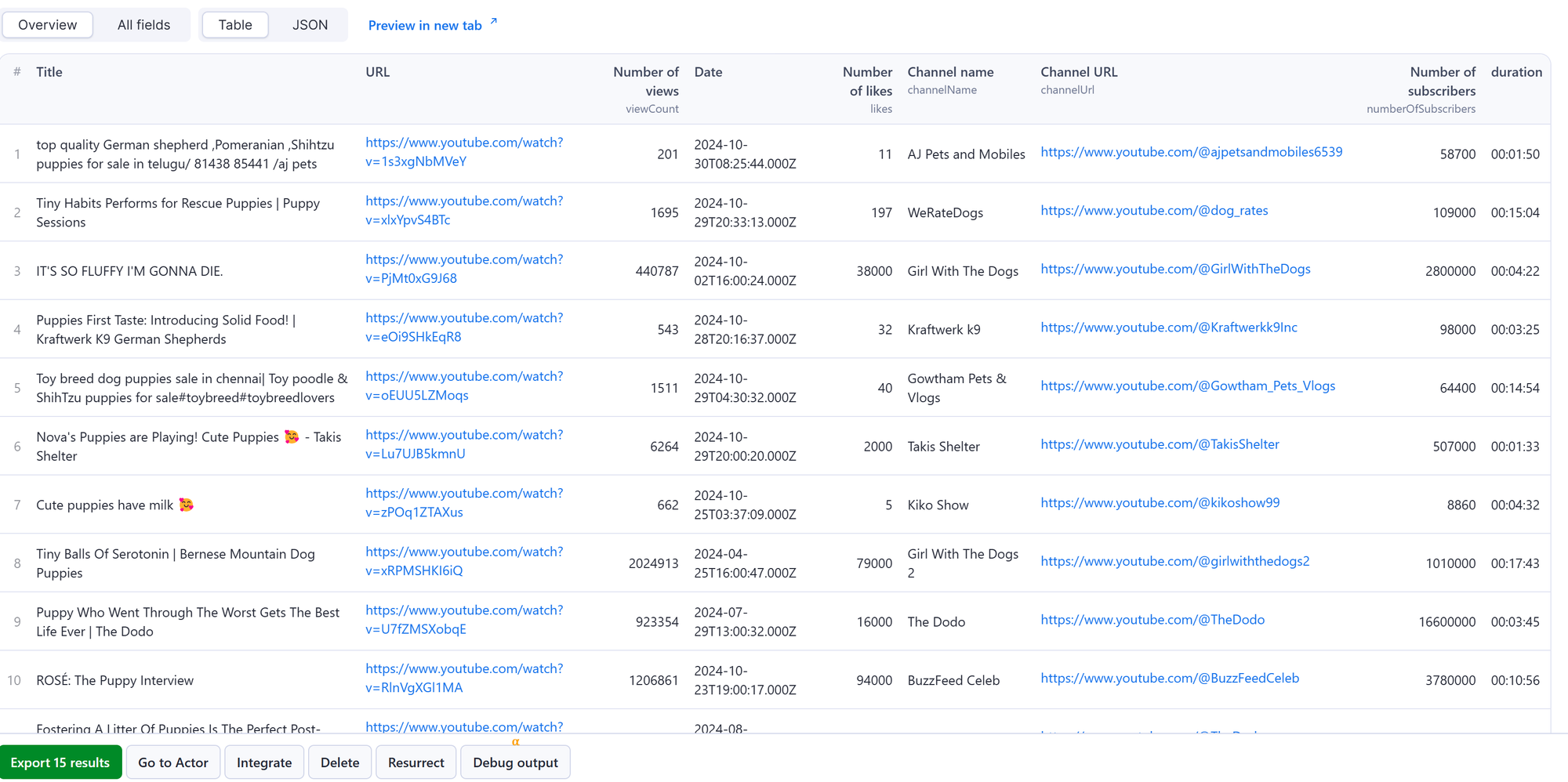
How to extract YouTube data?
Extracting YouTube data is easy. All you need to do is:
- Choose the YouTube scraper you need
It’s not only about YouTube Scraper. Do you need to get data about something specific like shorts or comments? Try another Actor from Apify Store. Here they are:
| 📹 YouTube Shorts Scraper | 📺 Fast YouTube Channel Scraper |
|---|---|
| 🖹 YouTube Comments Scraper | #️⃣ YouTube Video Scraper by Hashtag |
- Fill in the input form and click on the
Startbutton. - Read our step-by-step guide on on how to scrape YouTube for more information.
Is it legal to scrape YouTube comments?
As YouTube comments are publicly available on the internet, you can scrape them without worrying about the legality of doing so.
Moreover, scraping information from comments can significantly help with your market research. Comments can reflect emerging trends and topics within your industry or niche. By scraping comments from relevant videos, you can stay updated on what's currently popular, helping you customize your content and marketing strategies accordingly.
5) Social Media Hashtag Research
Are you looking for a tool that can scraper all social media sites at once? Look no further! Social Media Hashtag Research gets you information about posts with the same hashtag from TikTok, Instagram, Facebook, and YouTube.
You’ll get not only basic profile info but also posts’ URLs, captions, timestamps, likes, dislikes, views, and comments count.
Let’s say you are about to do research on trending topics with the hashtag #OOTD. Simply fill in the input form with “OOTD” and run the scraper. Here are the results:

6) Leads Analyzer
Are you in the lead gen industry and still looking for a high-quality lead extraction tool that can enrich your lead information?
Social Media Leads Analyzer gets you data from leads' social media accounts—Instagram, LinkedIn, Facebook, TikTok, YouTube, Twitter, Pinterest, and even Discord.
All you need to know beforehand is the leads’ website URL.
How it works?
- Simply prepare the list of your leads’ URLs and put them into the Social Media Leads Analyzer input field. First, you’ll need to create an account on Apify. With our free plan, you can get up to 250 results.
- Fill in the URLs of your leads. As an example, let’s scrape the contact details of some pop music icons. This is the input:
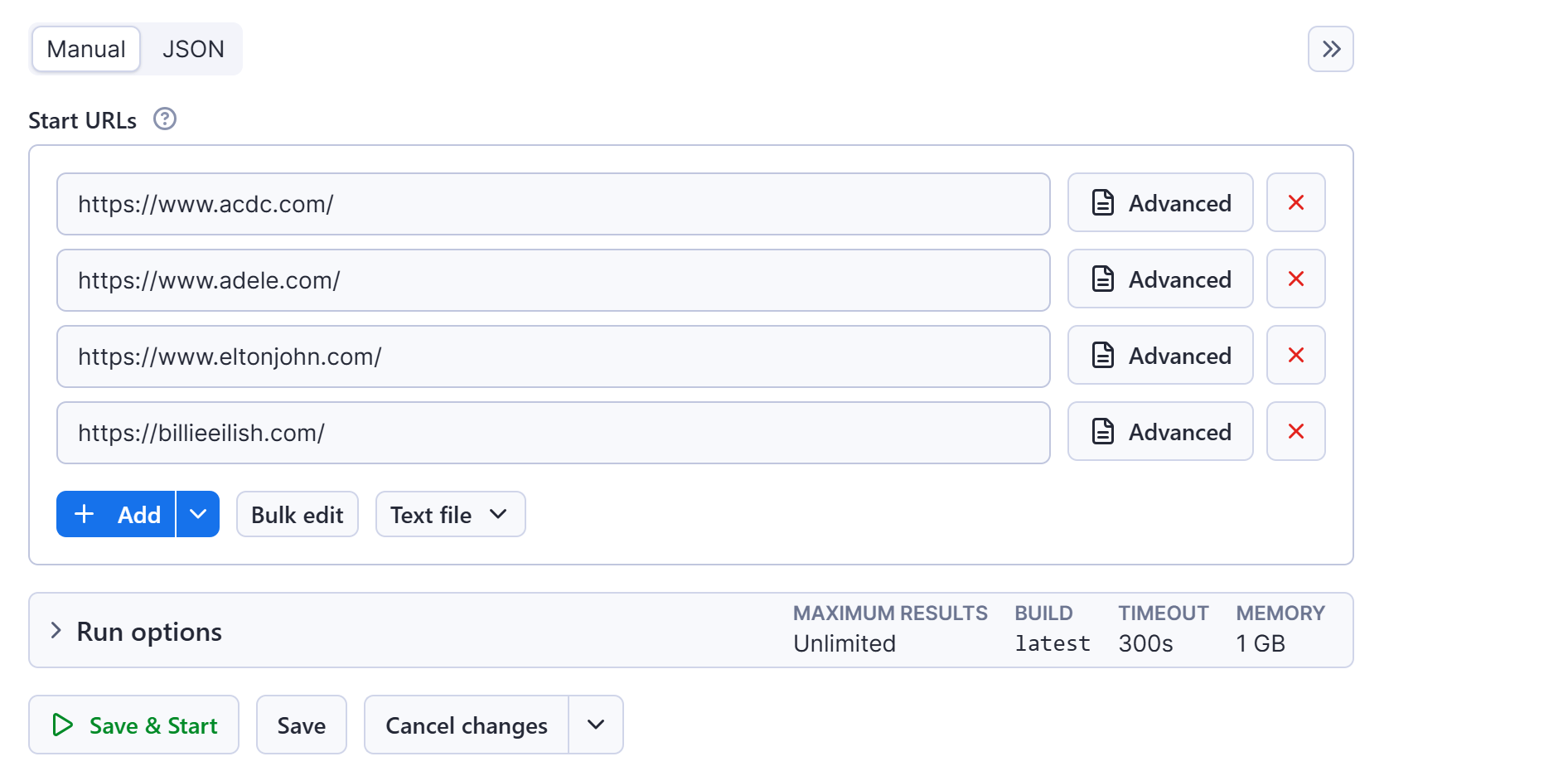
- This will get you data from all social media. Not only the profile name, but also the number of followers, views, posts, and much more. You can even verify the email and phone number if it appears on the website.
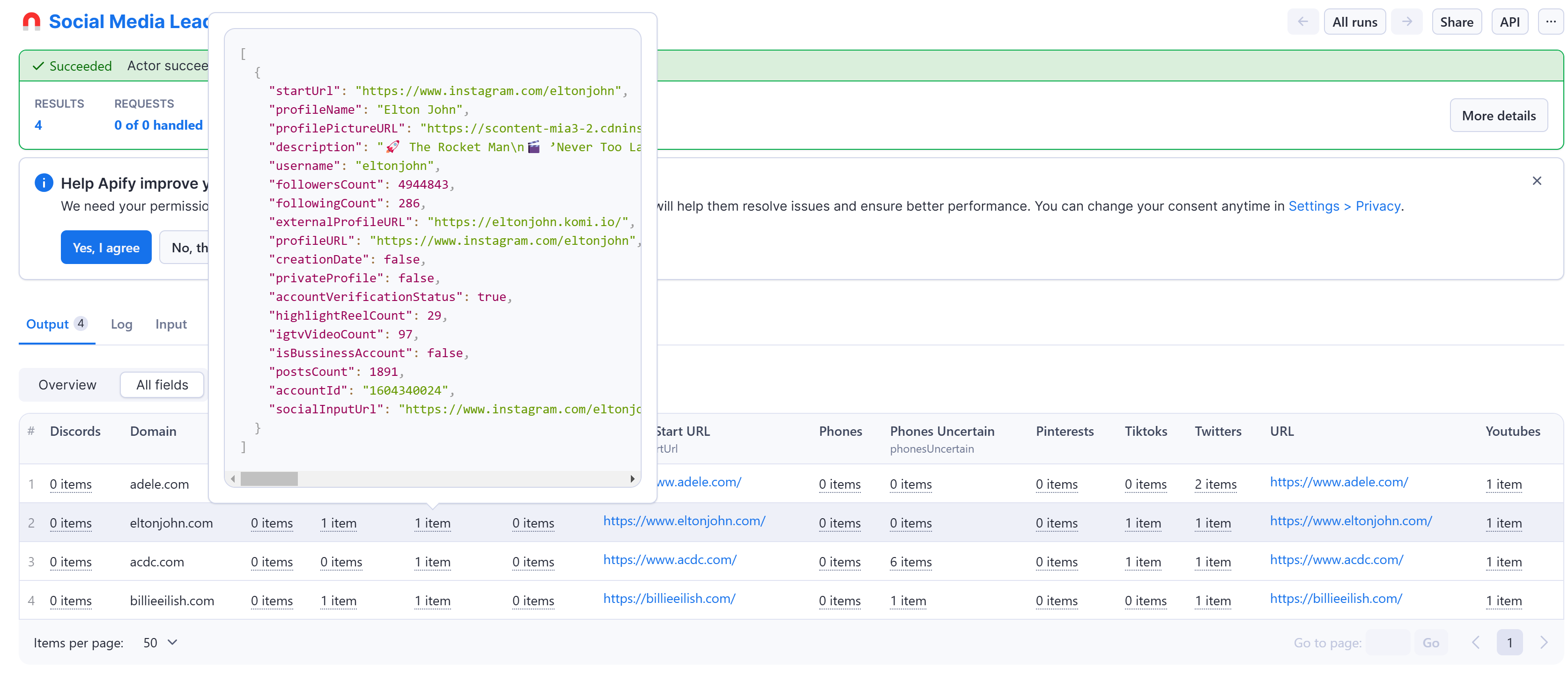
7) Social Media Sentiment Analysis Tool
Are you stuck with your sentiment analysis? Then this is the tool for you. It combines scraping comments from social media - Facebook, Instagram, and TikTok - and analyzing them. You’ll get information about each comment, whether it’s negative, positive, or neutral. What more do you need?
With Apify, you can analyze 2,000 comments for free. All you need to do is sign up, navigate to Social Media Sentiment Analysis Tool, and type in the social profile name.
Let’s assume that I want to know how Arnold Schwarzenegger is doing on social media. I just put his name in the input field and hit the Start button. In less than a few minutes, I get this information about the newest comments on his profiles across social media.
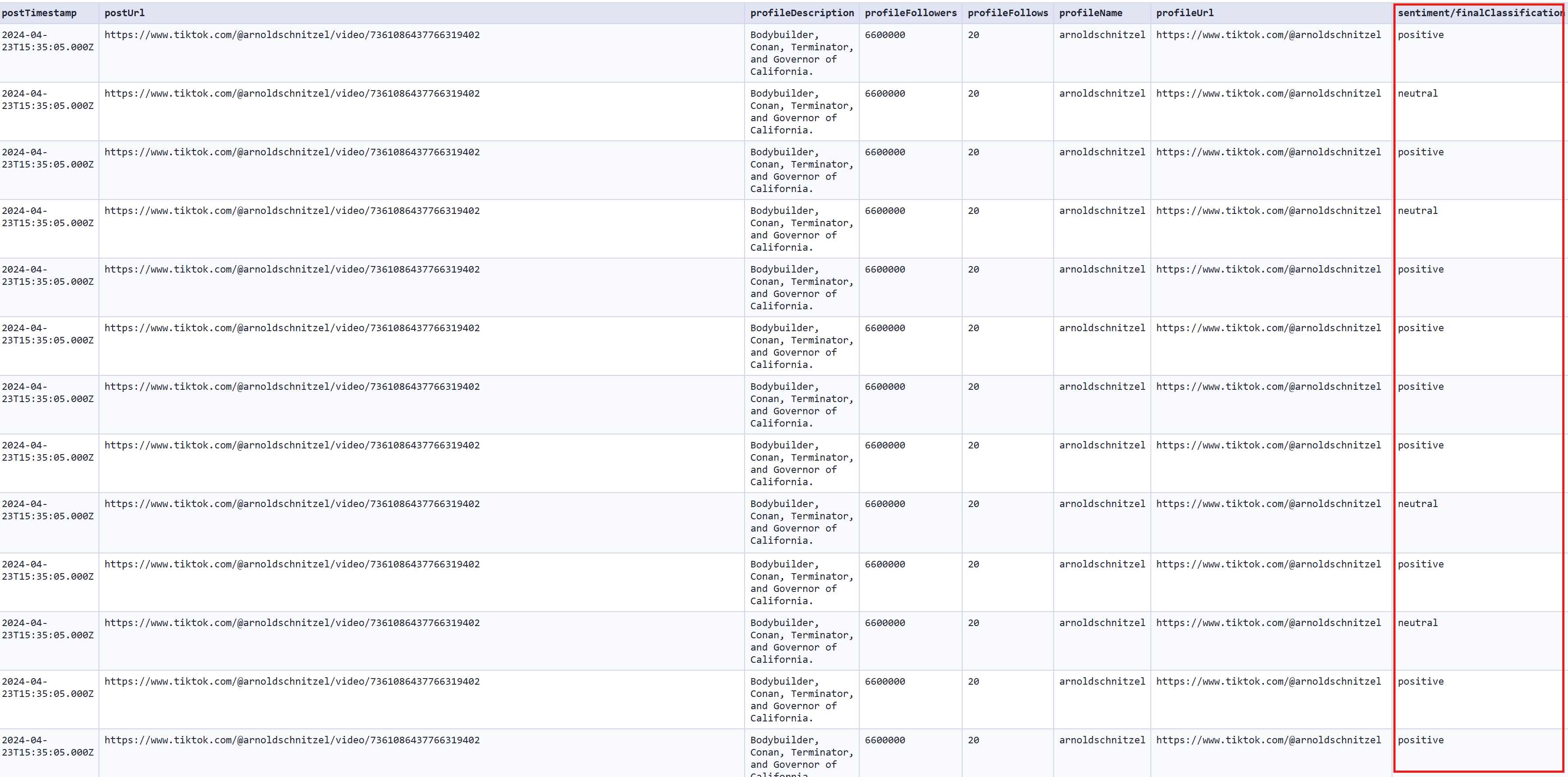
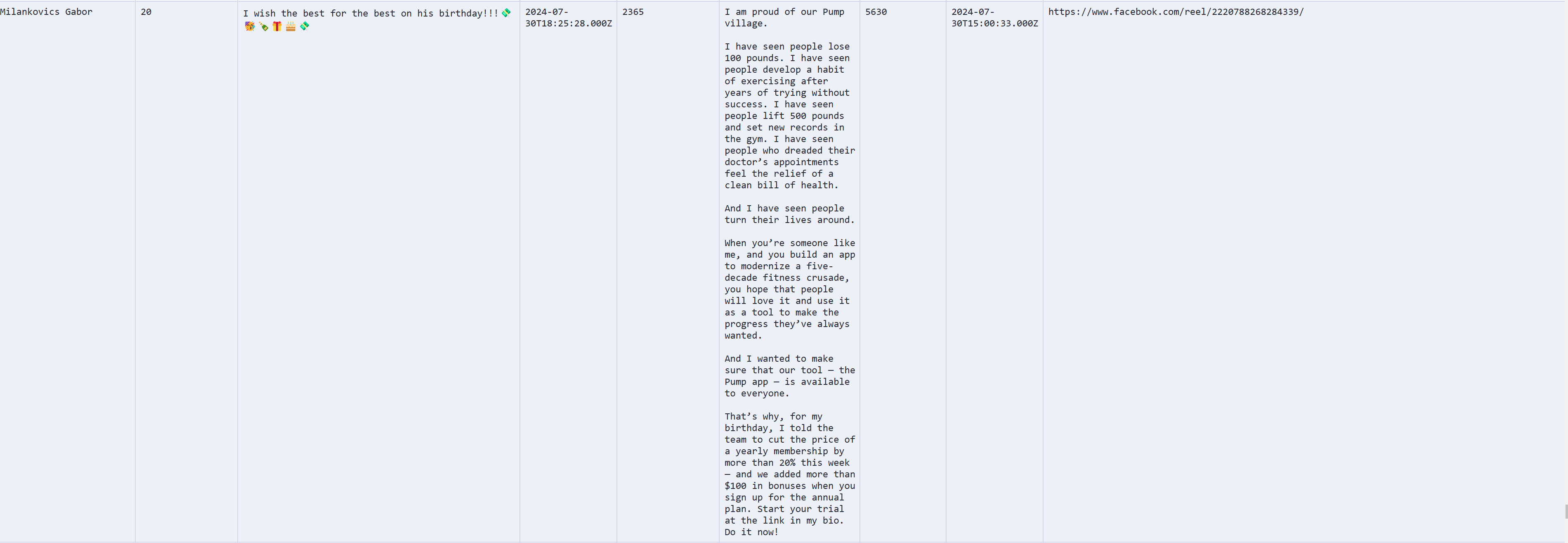
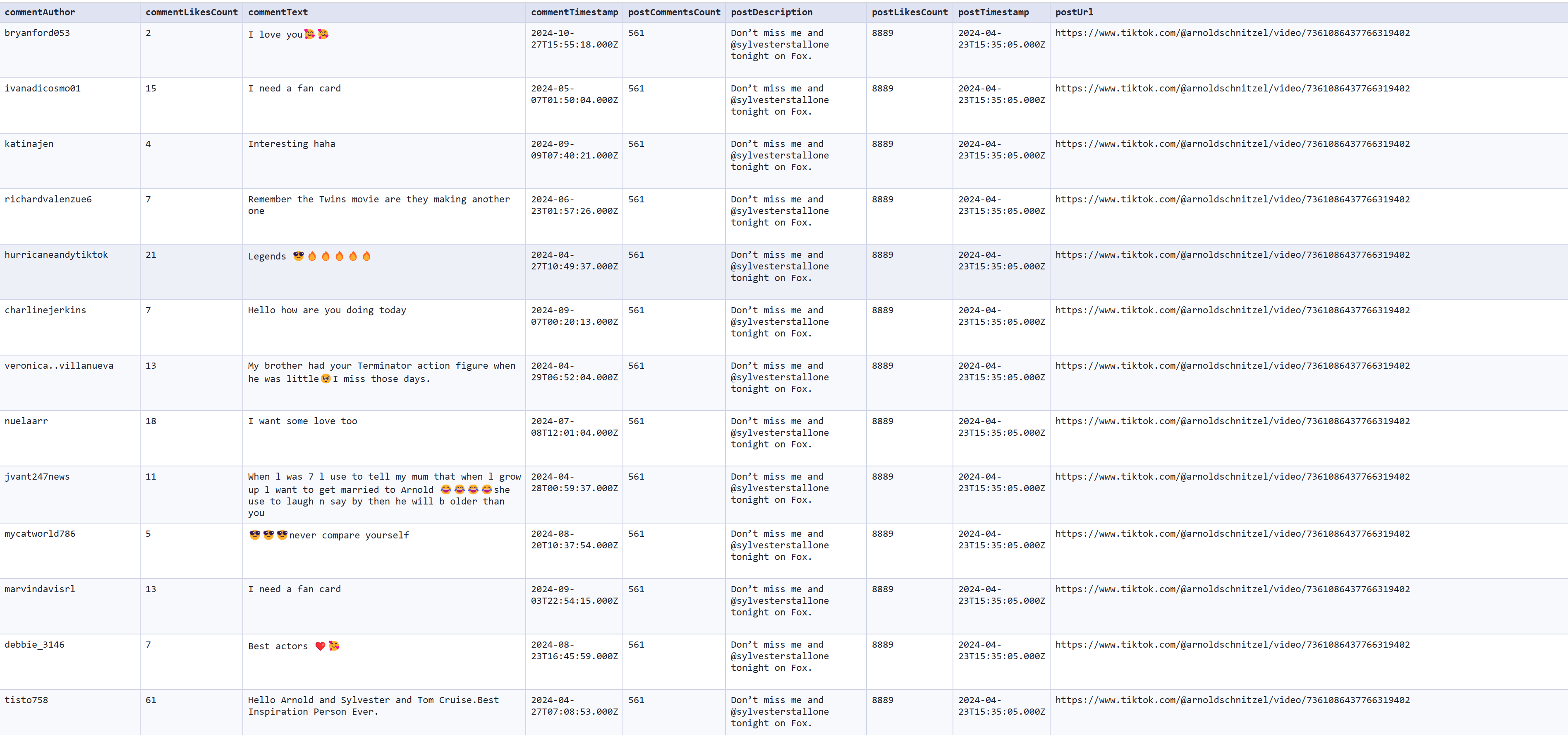
The results include not only the comments but also the analysis - whether they're positive, negative, or neutral
8) Social Media Finder
Last but not least, let me introduce you to Social Media Finder. If you don’t want to spend time searching for someone’s social media profiles anymore, this tool will do the heavy lifting. Just by typing in the probable profile name, you’ll get direct links and information about this person’s profiles on:
- ▶️ YouTube
- 🎵 TikTok
- 🐙 GitHub
- ✍️ Medium
- 🎮 Steam
- 🧵 Threads
- 🎥 Twitch
- 🗣️ AskFM
- 🔗 Discord (invite links)
With $5 of monthly usage credits on Apify’s free plan, you can get 2,500 results every month.
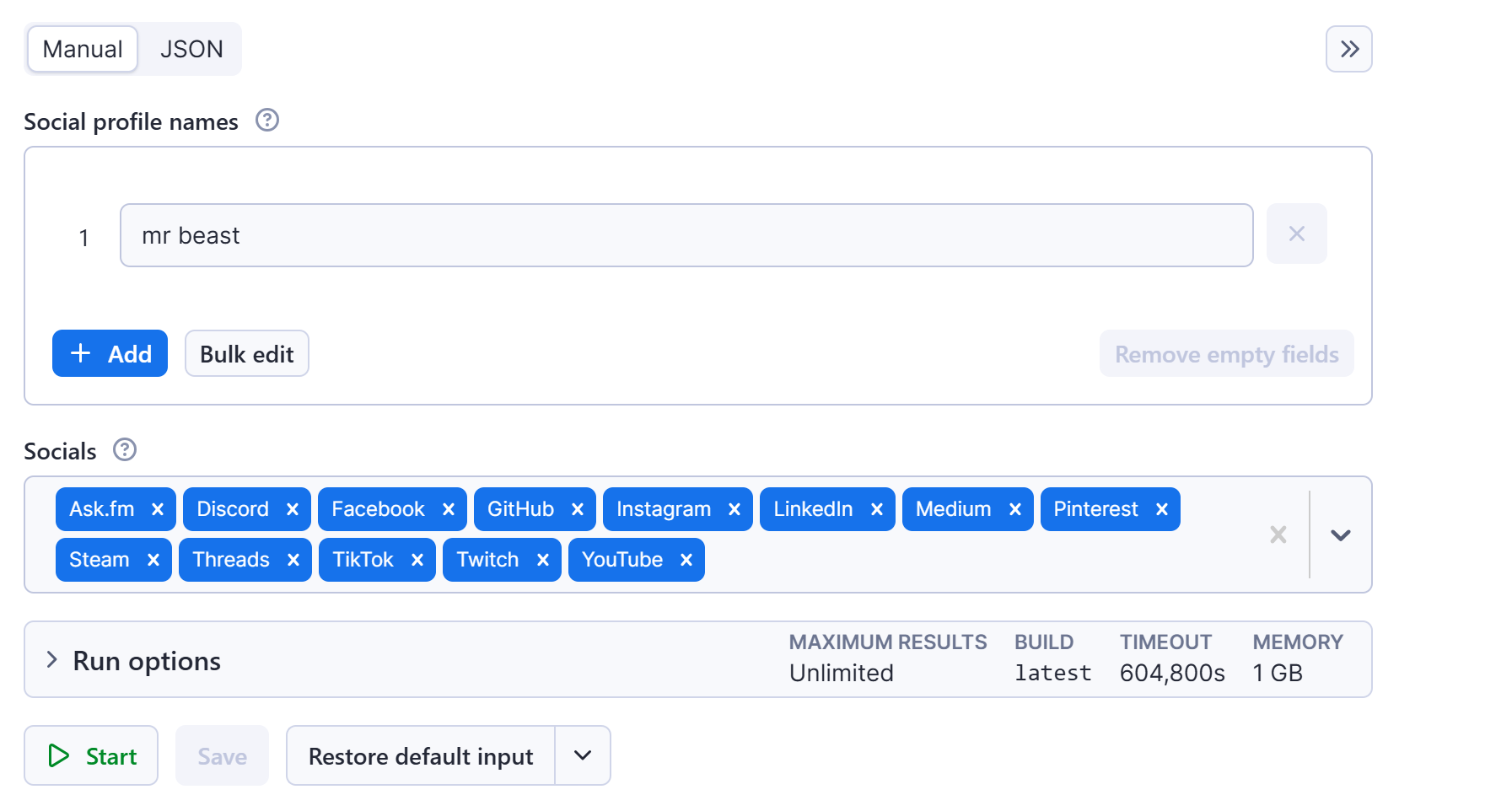
Now you know how to use the best 8 social scrapers to help you boost your business.
Simply add them to your marketing or research toolkit, and they’ll support your hunches about trends and refine your strategies.
However, always keep in mind that while scraping web data can provide valuable insights, it's essential to combine it with other data sources and your own expertise to make well-informed decisions.
Meet other social media scrapers
If you thought 8 scrapers was a lot, you might want to explore our offer for every social media web scraping case.
In Apify Store, you can find a tool to scrape Twitter, Telegram, Snapchat, Twitch, Pinterest, Quora, Onlyfans, Threads, Whatsapp, Mastodon, and even LinkedIn.
Heck, we might even get a Clubhouse scraper someday – go ahead if you want to build it and publish it. Is anything lacking on that list? Let us know on the Ideas page.
Frequently asked questions
⚙️ What exactly is web scraping?
Web scraping is the automated process of collecting data from websites. Usually, it involves accessing a website's HTML code and parsing it to extract specific information such as text, images, or pricing details. Web scraping is the go-to method for fast and systematic gathering of web data, especially data from social media.
Find out more in our guide to web scraping 101.
💡 What are social media scrapers?
Social media scraping tools were created to extract and analyze data from platforms like Instagram, TikTok, Facebook, Reddit, and YouTube. Getting data from social media consistently and at scale enables digital media marketers, researchers, and business professionals to have a clear understanding of any audience and make more informed decisions about its engagement.
❓ Why scrape social media?
Data itself is useless without a clear understanding of how to apply it. And the more data there is — especially if it’s user-generated like in the case of social media platforms — the more ways appear on how to turn it into a use case.
With social media scrapers you can:
- Track sentiment, reviews, comments
- Enrich your leads and get their contact details
- Create your social marketing strategies
⚖️ Is social media scraping legal?
It's important to acknowledge that responsible and ethical scraping practices are key to preserving the integrity of the open web and the stability of scraped websites.
If you want to adhere to these policies, it's useful to be familiar with each platform's usage terms, legal considerations, and privacy policies to ensure compliance. Our detailed guide on the do's and don'ts of web scraping is a great place to start.
Social media scraping generally falls into a legal gray area (especially when compared to scraping other website types), given that it often involves collecting personal information like names. However, there are numerous scenarios where scraping social media is not just permissible but necessary.




